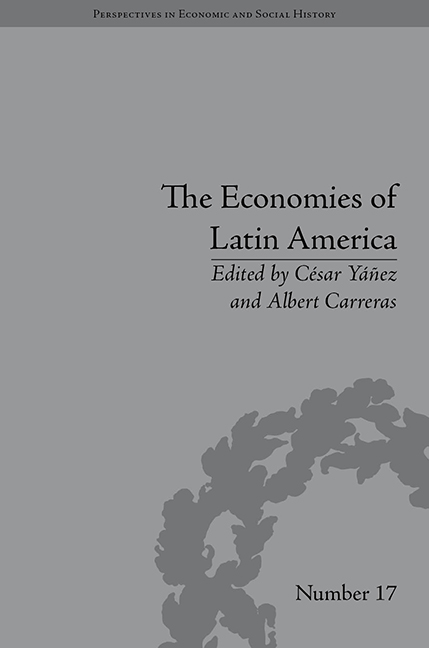Book contents
- Frontmatter
- CONTENTS
- List of Figures and Tables
- List of Contributors
- Preface
- Introduction: Latin American Economic Backwardness Revisited
- 1 Expectations, Institutions and Economic Performance: Latin America and the Western European Periphery during the Twentieth Century
- 2 On the Accuracy of Latin American Trade Statistics: A Non-Parametric Test for 1925
- 3 Latin America and Its Main Trade Partners, 1860–1930: Did the First World War Affect Geographical Patterns?
- 4 The Structure of Latin American Investment in Equipment Goods during the Mature Period of the First Globalization
- 5 Factorial Distribution of Income in Latin America, 1950–2000: New Series from the National Account Data
- 6 The Influence of the First World War on the Economies of Central America, 1900–29: An Analysis From a Foreign Trade Perspective
- 7 Economic Modernization in Adverse Institutional Environments: The Cases of Cuba and Chile
- 8 Capital Goods Imports, Machinery Investment and Economic Development in the Long Run: The Case of Chile
- 9 The Sugar Industry, the Forests and the Cuban Energy Transition, from the Eighteenth Century to the Mid-Twentieth Century
- 10 Empirical Debate on Terms Of Trade and the Double Factorial Terms of Trade of Colombia, 1975–2006
- 11 Public Revenues in Bolivia, 1900–31
- 12 The Consumption of Durable Goods in Latin America, 1890–1913: Analysis and Estimation of a Demand Function
- Notes
- Index
10 - Empirical Debate on Terms Of Trade and the Double Factorial Terms of Trade of Colombia, 1975–2006
- Frontmatter
- CONTENTS
- List of Figures and Tables
- List of Contributors
- Preface
- Introduction: Latin American Economic Backwardness Revisited
- 1 Expectations, Institutions and Economic Performance: Latin America and the Western European Periphery during the Twentieth Century
- 2 On the Accuracy of Latin American Trade Statistics: A Non-Parametric Test for 1925
- 3 Latin America and Its Main Trade Partners, 1860–1930: Did the First World War Affect Geographical Patterns?
- 4 The Structure of Latin American Investment in Equipment Goods during the Mature Period of the First Globalization
- 5 Factorial Distribution of Income in Latin America, 1950–2000: New Series from the National Account Data
- 6 The Influence of the First World War on the Economies of Central America, 1900–29: An Analysis From a Foreign Trade Perspective
- 7 Economic Modernization in Adverse Institutional Environments: The Cases of Cuba and Chile
- 8 Capital Goods Imports, Machinery Investment and Economic Development in the Long Run: The Case of Chile
- 9 The Sugar Industry, the Forests and the Cuban Energy Transition, from the Eighteenth Century to the Mid-Twentieth Century
- 10 Empirical Debate on Terms Of Trade and the Double Factorial Terms of Trade of Colombia, 1975–2006
- 11 Public Revenues in Bolivia, 1900–31
- 12 The Consumption of Durable Goods in Latin America, 1890–1913: Analysis and Estimation of a Demand Function
- Notes
- Index
Summary
Introduction
The causes and historical determinants of development and economic growth or, conversely, the causes of backwardness and poverty, constitute one of the main problems that deserve serious attention in the field of economics and economic history. Not in vain the book that for many is the cornerstone of modern economics was entitled An Inquiry into the Nature and Causes of the Wealth of Nations. Through the centuries many ideas and schools of though have developed, some of whom can be defined according to the typology of explanations they formulate with respect to this particular problem.
This paper is about the Prebisch-Singer (P-S) hypothesis on international trade, which was formulated in the mid-twentieth century, and which we interpret as an attempt to create an analytical framework to explain the growing gap in welfare and develop levels among different regions in the world from its trade relations. In this sense we can say that the P-S hypothesis belongs to the fields of both economics and economic history. This hypothesis, besides being a significant challenge to the hegemony maintained by the neoclassical theory of trade, was the theoretical base for trade policies of many countries in the periphery during the middle decades of the twentieth century and, even though its influence in economic policy has been undermined in the last three decades, remains fervently debated in economics and economic history literature.
- Type
- Chapter
- Information
- The Economies of Latin AmericaNew Cliometric Data, pp. 147 - 166Publisher: Pickering & ChattoFirst published in: 2014



